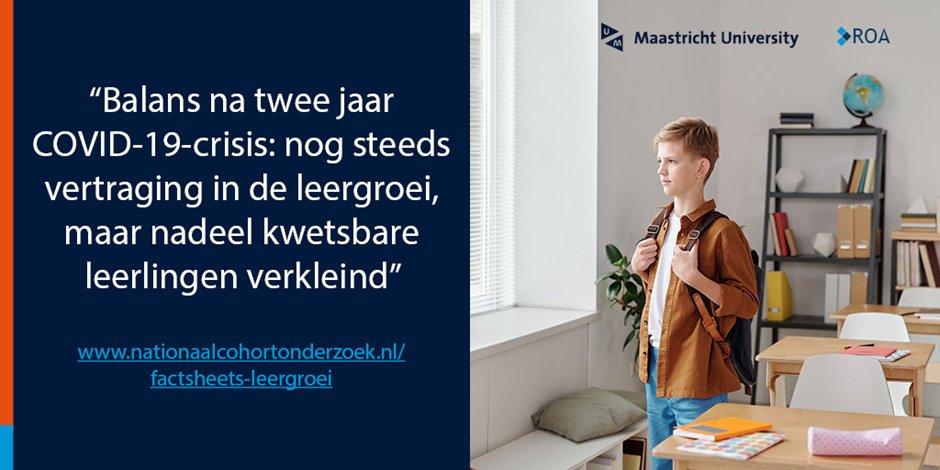
Today we published already the fourth update of our research on inequality and learning loss of Dutch primary school children after 2 years of COVID-19 pandemic based on the #NCO-project (Netherlands Cohort Study on Education) from @hetnro. A thread with our findings 1/22👇
Based on ~800k primary school students from ±2200 schools (±36% of total) we analysed standardized tests on reading, spelling and maths that were written right before COVID-19 started (Feb 2020), in March 2021 and in Feb 2022. 2/22
We compare the learning gain in the COVID-year with a similar time period in the years before. We study learning gain over the full period of 2 years and we compare the first (March20-March21) and the second year of COVID-19 (March21-March22) with each other. 3/22
In this period of 2 years two school closures took place in the first COVID-year, and learning was continuously interrupted in the second year, as students, teachers, classes and even whole schools were sent home due to COVID-19 infections. 4/22
At the same time schools and students also worked hard to undo the learning loss from before. The question is what the state of affairs is now? And how does the second year COVID-19 compare to the first wrt learning gain? 5/22
The good news is that after two years the learning losses for reading are largely undone. The small differences in learning gain that we still see are not meaningfully different from before COVID-19. However, for maths and spelling, there are still substantial delays. 6/22
After 2 years of COVID-19 we find that students have on average 0.03 SD lower learning gain for reading, 0.23 SD for maths and 0.27 SD for spelling compared with the years before the COVID-pandemic. 7/22 

Similar to our previous analysis, the learning losses are not evenly distributed over types of students and types of schools, especially for spelling and maths. 8/22
Students with low educated parents have about 1.5 times more learning loss than students from high educ parents. This difference was 2 times higher in our previous analyses so inequality seems to be decreasing 9/22 

Furthermore, we find large differences between schools. Students at schools with a high share of students with low educated parents encountered an even higher learning loss during this period. This is on top of the findings for parental education. 10/22
If we look at the development over our analyses from half a year, a full year, one-and-a-half year and now 2 years of COVID-19, we see a downward trend in learning loss for reading, but not so much for maths and spelling. 11/22 

Interestingly, the separate analyses for the first and second year COVID-19 show that the encountered learning loss in the second year is about equal or even a bit higher than in the first year. 12/22 

When looking at the first and second COVID-19-year separately for student and school characteristics, we find that disadvantaged students and schools have more learning loss in the first year, but that this is turned around in the second year. 13/22
The OLS regressions are estimated with robust standard errors clustered at the school level and are confirmed by several robustness checks, in which we, among others, control for student and school characts and apply inverse propensity weighting to account for selection. 14/22
Although catching up on the learning loss for reading is good news, the maths and spelling results are still quite alarming and indicate a delay in learning progress of about 10 weeks on a school year. 15/22
It is possible that this second year COVID-19 was even more disruptive for learning as we stepped out of crisis mode and tried to go back to normal, whereas the virus was still around and caused many students, teachers and even complete schools to be sent home regularly. 16/22
Lastly, it is worrisome that the differences between (types of) students and schools are still quite big, and that some differences by student background have only gotten slightly smaller (and unfortunately at the cost of the other students) despite efforts of many schools. 17/22
Full factsheets (in Dutch) on which this thread are based can be found here: nationaalcohortonderzoek.nl/factsheets-lee…. 18/22
Many thanks to the amazing NCO-team from @ROAMaastricht: @R_vander_Velden, @madelon_jacobs, @ChayenneSmeets, @Lynn_van_Vugt, Henry Abbink, Sabine Baumann, Willemijn Havermans, Ineke Bijlsma, Timo Huijgen, @arnoldhendrikse, Mélanie Monfrance & Sanne van Wetten. 19/22 

This thread is a follow up on three previous threads of our study on the first school closure in the Netherlands, the previous ones to be found here:
here
and here
20/22
https://twitter.com/CarlaHaelermans/status/1451091946018164737
here
https://twitter.com/CarlaHaelermans/status/1399992506490687490
and here
https://twitter.com/CarlaHaelermans/status/1374447206669819907
20/22
In the upcoming period we will publish more of these results, the next one in fall 2022. Stay tuned! 21/22
For the Dutch readers among you: there is a separate thread in Dutch about this as well:
https://twitter.com/CarlaHaelermans/status/152649161399173529622/22
• • •
Missing some Tweet in this thread? You can try to
force a refresh




